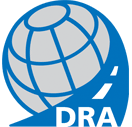This article needs additional citations for verification .(June 2025) |
 | |
| Company type | Private |
|---|---|
| Industry | Engineering, Construction, Airports, Highways, Metro Rail and Railways |
| Founded | 1972 |
| Founder | Dineshchandra R. Agrawal |
| Headquarters | Ambawadi, |
Area served | India, Bangladesh, Mauritius and Nepal |
Key people | Dineshchandra R. Agrawal (Chairman & MD) Jagdishchandra Agrawal (Director) Bharatkumar O. Agrawal (Director) Hardik D. Agrawal (CEO & Director) |
| Services | Engineering, Procurement and Construction (EPC) |
| Revenue | ₹3,864 crores (2021-22) |
| ₹231 crores (2021-22) | |
Number of employees | 4,000 (March 2020) |
| Website | www |
Dineshchandra R. Agrawal Infracon Private Limited or DRA Infracon is an infrastructure development and construction company based at Ahmedabad in Gujarat, India. [1] [2] It was founded by Dineshchandra Rameshwarji Agrawal at Deesa in Banaskantha district of Gujarat in 1972. DRA Infracon got incorporated in the Ministry of Corporate Affairs on 7 November 2003. [3]
Contents
The company operates in construction sector in Airports, Bridges, Highways, Expressways, Metro Rail, Railways, Smart Cities, and Water supply. [4]